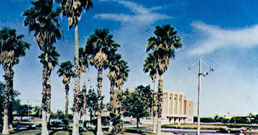Oil was discovered in commercial quantities in the southwest of Iran on May 26, 1908. It had taken seven years of exploration to discover this first oil field in the Middle East. It was a momentous event with far-reaching consequences for the political, social and economic fortunes of the country, and ushered in a new era in the history of the Middle East. The first oil well was drilled in a tribal winter pastureland in the province of Khuzestan. The land was also home to the ruins of an ancient Zoroastrian fire temple. This was not a coincidence. In some places, oil seeps through fractures in the ground to the surface. These oil leaks had been known to and used by the local people for centuries. Zoroastrian temples, needing a source of energy for their perpetual fire, were often built close to these major oil seeps.
The first oil well in this area, which later became the city of Masjed Soleiman, was followed by many more, and eventually gave birth to a vast oil industry. The oil facilities set up in the province, including the newly built oil refinery in Abadan which was the biggest in the world for many years, attracted a huge work force. The local population and people of various nationalities and origins, from the Bakhtiari tribesmen to Armenians, Indians and the British, converged on the area and settled in the houses and whole neighbourhoods specially built for them. Houses were erected in a variety of styles and with different levels of amenities for labourers, lower and middle-ranking employees, and the top executives of the Oil Company. Cinemas, social clubs, and coffee shops, were also set up for their recreation.
The newly built streets and neighbourhoods of course had to be named. Most names are one way or another connected to the oil industry. The neighbourhood around oil well no.1, for example, was named Number One, and the area close to oil well no.40 was called Number 40 by the local people. The easily pronounced name of Aframby is a metamorphosis of FR&B which was the abbreviation of a unit of the Oil Company. The influence of the English language, because of the predominant presence of the British at the time, is also evident. The names are either borrowed directly from English such as Camp Crescent, Nurse Hostel, Scotch Camp and Rail Ville, or are distorted forms of the original English, such as the neighbourhood around the first ‘coffee shop’ which is called Kofeisheh, or the area close to the ‘C-Branch’ of the company which became C-Berenj.
Sadly, several factors, particularly the eight-year long war between Iran and Iraq, had a devastating impact on these areas, from which they have not yet fully recovered. There was large scale destruction of property and oil facilities, as well as many human casualties and mass migration to other parts of the country. But the old names of the neighbourhoods have survived, and they alone can bring back the memories of the bygone days.
In this multimedia report, we walk down these memory lanes, and explore the origins of their names.


